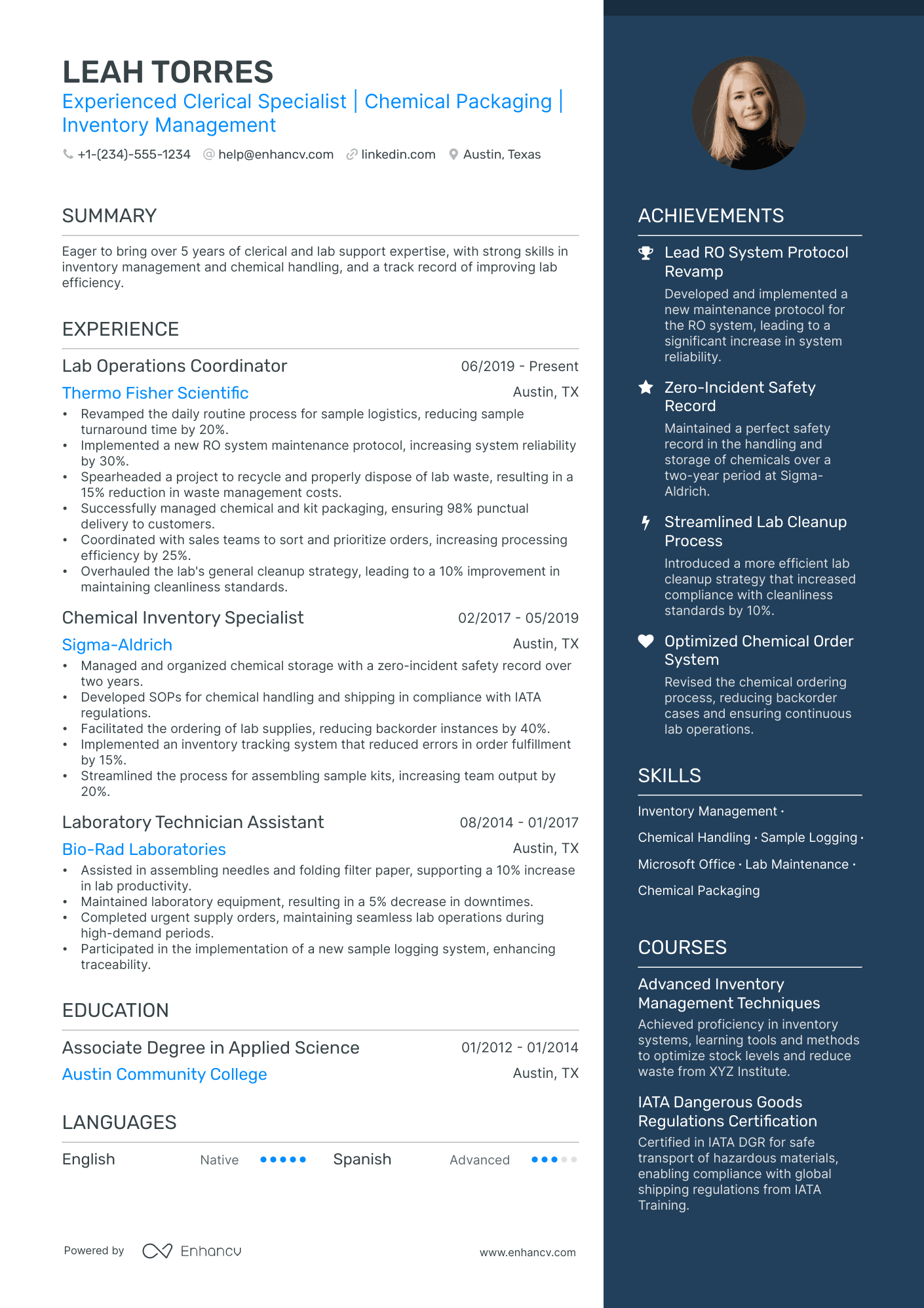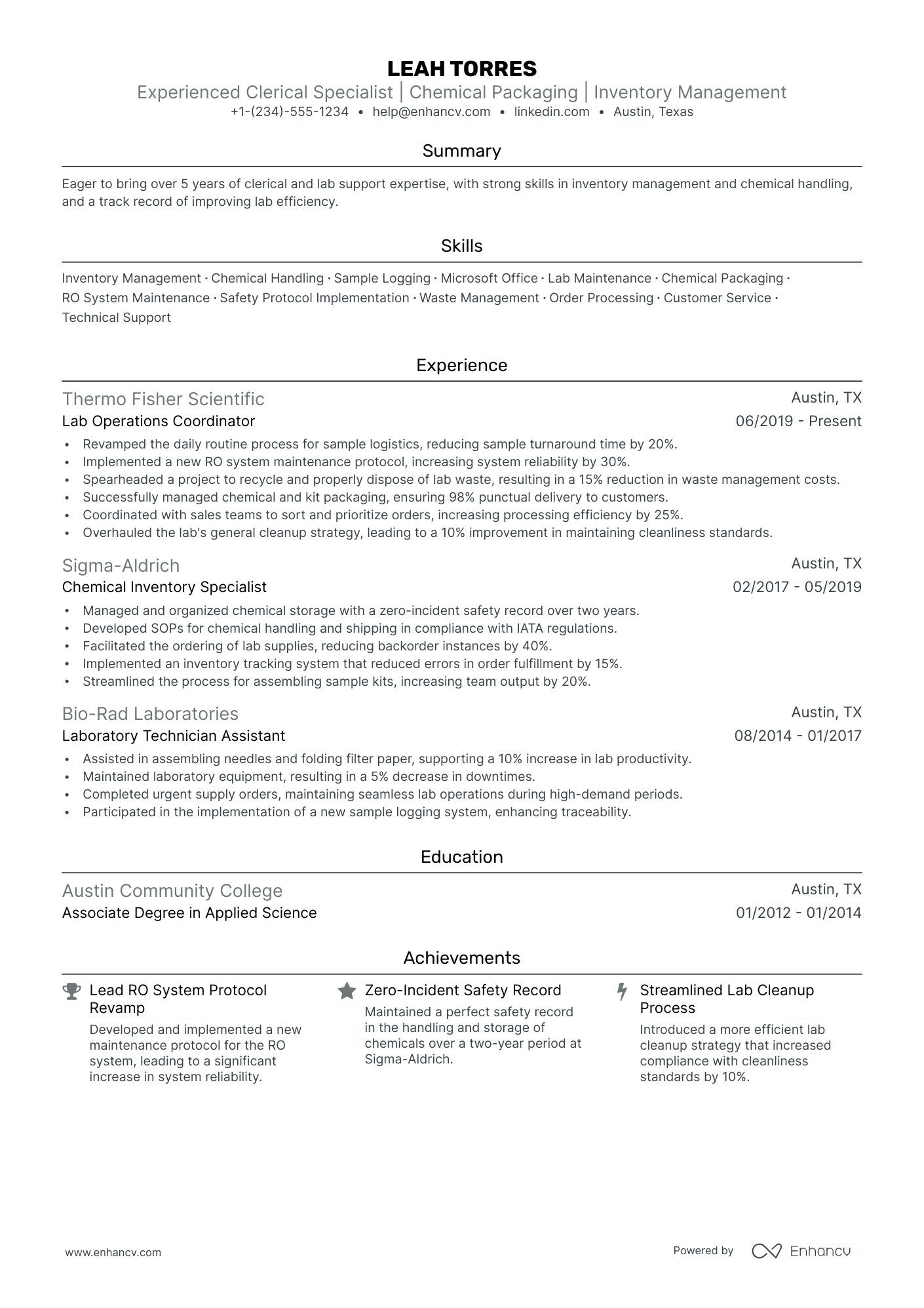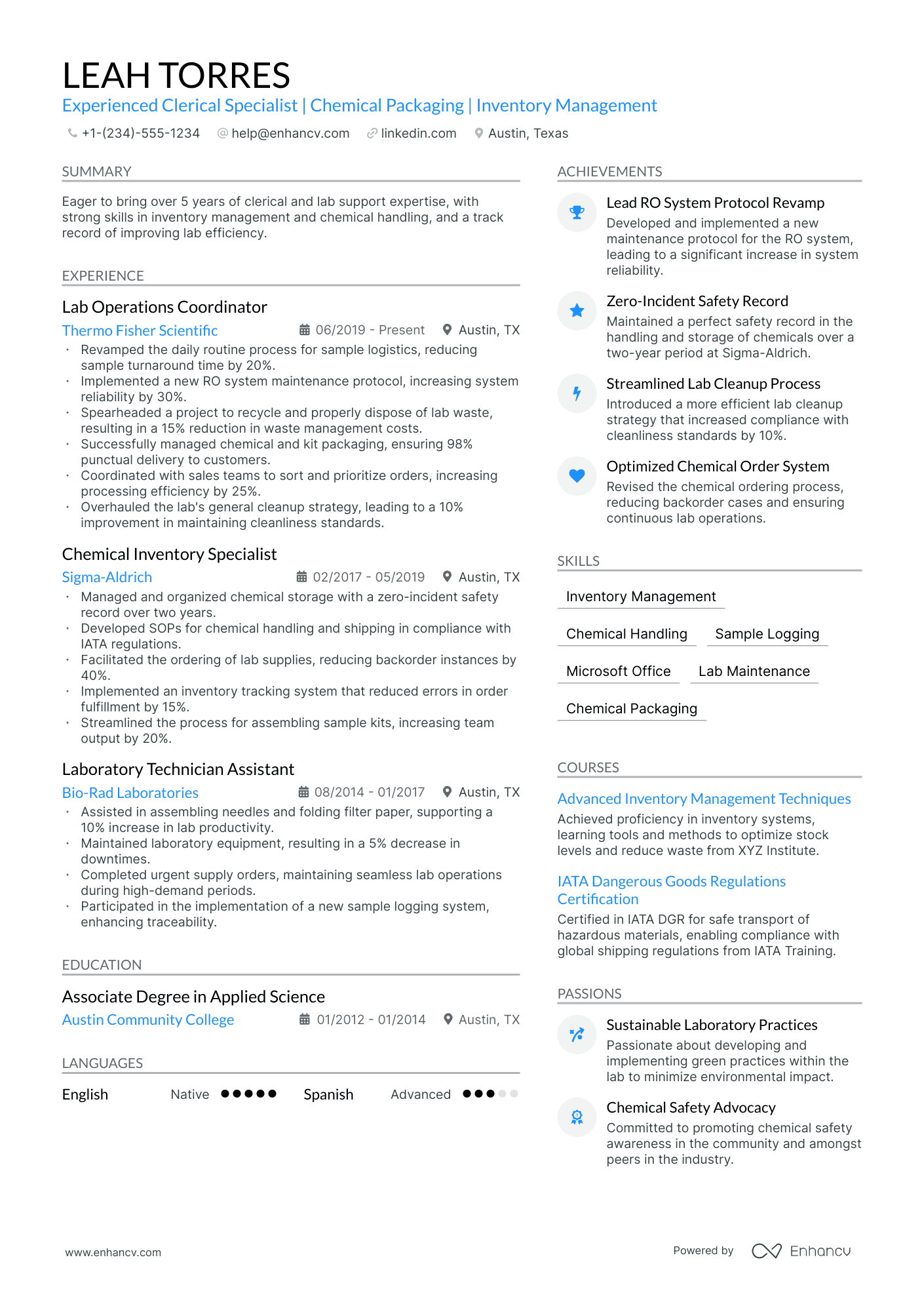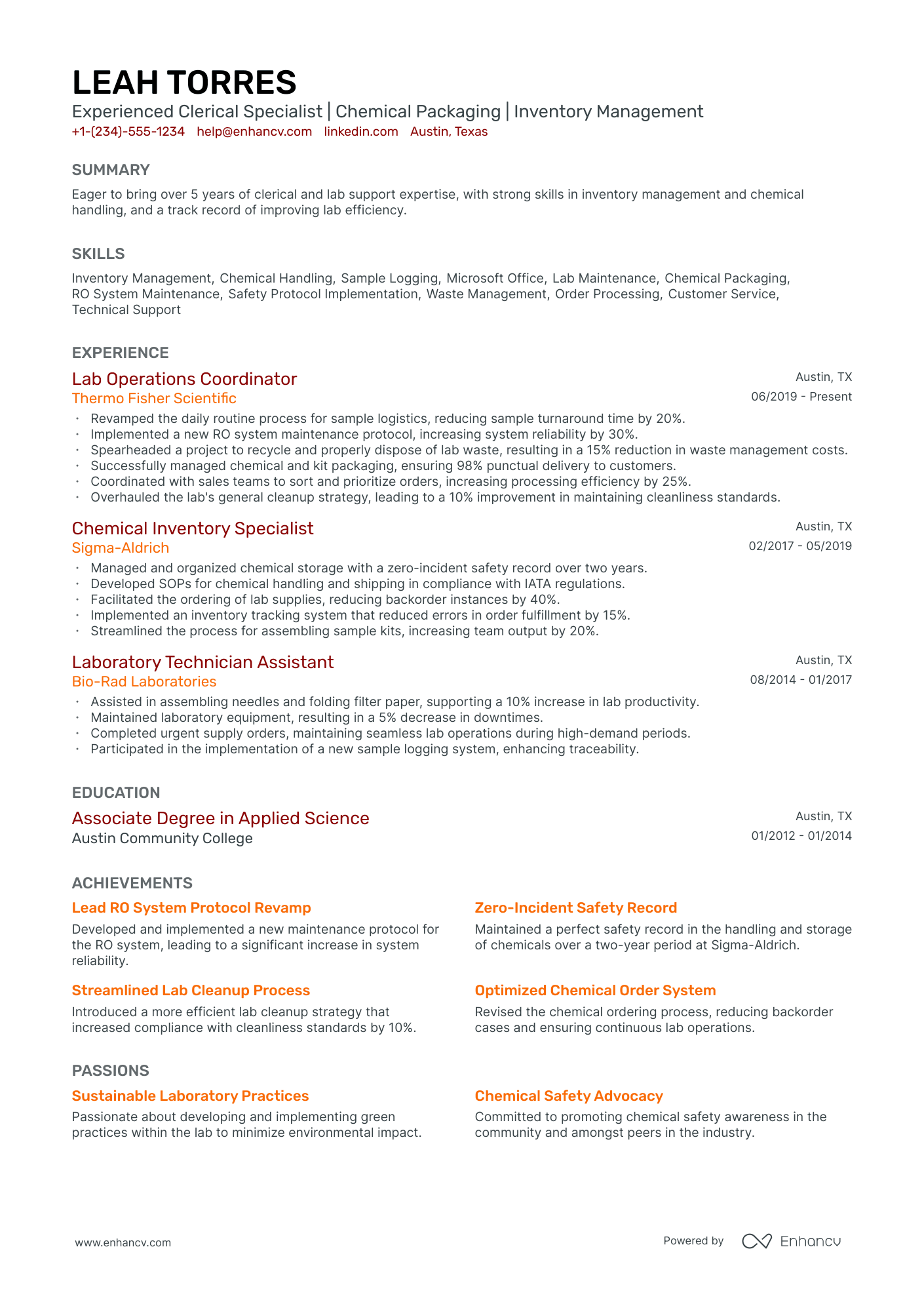As a lab assistant, articulating your hands-on experience and technical skills in a concise yet comprehensive way can be a significant resume challenge. Our guide will provide you with targeted tips and examples to showcase your laboratory expertise effectively, ensuring your resume stands out to potential employers.
- The most effective lab assistant resume samples, reflecting on experience and skills.
- +10 simple, yet impactful methods to tailor your lab assistant resume to the job advert.
- Using your professional achievements as the North Star to your unique value as a lab assistant candidate.
- 'No one cares about your education nowadays …' Let's prove this statement wrong with the best-kept industry secrets to your education and certifications.
If the lab assistant resume isn't the right one for you, take a look at other related guides we have:
- Chemist Resume Example
- Researcher Resume Example
- Research Director Resume Example
- Radiologic Technologist Resume Example
- Research Associate Resume Example
- Research Manager Resume Example
- Lab Technician Resume Example
- Scientist Resume Example
- Lab Manager Resume Example
- Research Assistant Resume Example
Don't Stress Out Over Your Lab Assistant Resume Format
Remember, the elaborate design of your lab assistant resume isn't what impresses recruiters most. They are primarily searching for candidates who meet the job requirements. The main aim of your resume should be to clearly and concisely explain why employers should hire you.
Here are four straightforward steps to consider in your lab assistant resume design:
- Organize your resume based on experience: Start with your most recent roles. Besides using reverse chronological order, choose jobs relevant to the position you're applying for.
- Include your contact details (and portfolio or LinkedIn link) in your resume's header to ensure recruiters can easily reach you. If considering adding a professional photo, check acceptable practices in different countries first.
- Don't omit essential lab assistant resume sections such as the summary or objective, experience, and education. These sections should reflect your career progression and align with job requirements.
- Maintain conciseness in your resume. For those with less than ten years of experience, a one-page format is advisable.
Regarding the format to submit your lab assistant resume, PDF is preferable. PDFs are more likely to maintain their formatting when processed through recruitment software or ATS, saving you time in the application process.
When selecting a font for your lab assistant resume, consider the following:
- Choose ATS-friendly fonts such as Exo 2, Volkhov, Lato, etc., to keep your resume's content legible;
- All serif and sans-serif fonts are easily readable by ATS;
- While Arial and Times New Roman are common choices, opting for unique typography can help your resume stand out.
Concerned about ATS compatibility with charts and infographics? Our recent study has debunked this and other myths.
Remember, resume layouts can vary by country – for example, a Canadian resume format could look different.
Upload & Check Your Resume
Drop your resume here or choose a file. PDF & DOCX only. Max 2MB file size.
PRO TIP
Always remember that your lab assistant certifications can be quantified across different resume sections, like your experience, summary, or objective. For example, you could include concise details within the expertise bullets of how the specific certificate has improved your on-the-job performance.
The five (plus) definite sections your resume for a lab assistant job should include are:
- Header with your headline, contact details, and/or a preview of your work
- Summary (or objective) to pinpoint how your success aligns with the role
- Experience with bullets of your most relevant achievements in the field
- Skills to integrate vital job requirements (both technical and personal)
- Your further dedication to the field, showcased via relevant higher education and/or certifications
What recruiters want to see on your resume:
- Hands-on experience with laboratory equipment and instruments (e.g., microscopes, centrifuges, titrators).
- Familiarity with safety protocols and the handling of hazardous materials or biological specimens.
- Demonstrable technical skills required for specific laboratory techniques (e.g., PCR, western blotting, ELISA).
- Attention to detail and strong documentation practices, including maintaining lab notebooks and preparation of experiment reports.
- Ability to follow standard operating procedures and assist in the design and implementation of new experimental setups.
Creating Your Lab Assistant Resume Experience to Catch Recruiters' Attention
Remember that for the lab assistant role, hiring managers are looking to see how your expertise aligns with their requirements. Here's where your resume experience section can help out. Make sure you:
- Include mainly roles that are relevant to the lab assistant job you're applying for;
- Don't go too far back in your experience - recruiters will only care what you did a decade ago if it's really important for the lab assistant role;
- Each bullet you include should say what you did, followed by the skills you used and the actual end result of your efforts;
- Quantify each of your achievements with numbers and possibly the overall effect it had on the organization;
- Highlight transferrable skills - or personal skills you've attained thanks to past jobs - that could be applicable within your potential workplace. This would showcase your unique value as a professional.
Formatting the experience section of your resume doesn't have to be an over-the-top deep dive into your whole career. Follow the lab assistant resume examples below to see how industry-leading professionals are presenting their experience:
- Managed and executed complex chemical analyses on blood samples for a study involving over 200 participants, increasing data accuracy by 25%.
- Operationalized a new labeling system for stored biological specimens, improving retrieval efficiency by 30% and reducing misplacement incidents.
- Authored detailed procedural documents for 5 major lab protocols that enhanced training effectiveness for new recruits.
- Oversaw the daily calibration and maintenance of lab equipment, leading to a consistent 10% decrease in downtime year-over-year.
- Contributed to research resulting in two published papers on molecular genetics by performing complex gene sequencing techniques.
- Participated in quarterly workshops to stay up-to-date with the latest laboratory technologies and protocols, enhancing lab service quality.
- Implemented a digital inventory management system, reducing material waste by 15% and optimizing stock level management.
- Delivered timely sample analysis reports that supported decision-making in 5 ongoing clinical trials.
- Trained 4 new lab assistants in sophisticated sample preparation and analysis techniques, enhancing team productivity.
- Conducted microbiological assays on over 300 samples, directly contributing to quality control in product development phases.
- Collaborated with the R&D team to develop a new antibiotic, assisting in experimental design and data collection procedures.
- Maintained stringent safety standards in the handling of hazardous materials, leading to zero safety incidents during tenure.
- Played a key role in a team responsible for the standardization of lab testing methods across a company with multiple international sites.
- Reduced cross-contamination risks by 20% through the implementation of an improved sterilization protocol.
- Facilitated cross-departmental communication, ensuring precise information transfer regarding sample statuses and experimental results.
- Spearheaded the adoption of a new analytical technique to quantify nanoparticle sizes, improving measurement precision by 40%.
- Provided critical support in the setup of a cleanroom facility, which enabled the launch of a new nanotechnology product line.
- Led a small team in a lean initiative to streamline specimen processing, yielding a 15% increase in throughput.
- Implemented and optimized a high-throughput screening process that increased daily assay capabilities from 200 to 500+ samples.
- Developed a new sample tracking system using LIMS software, enhancing traceability and reducing human error in sample handling by 60%.
- Engaged in collaborative studies that resulted in the early detection of a novel biomarker, aiding in disease research advancements.
- Managed the procurement and inventory of lab supplies, achieving a 95% on-time delivery rate for essential reagents.
- Assisted in developing a patented synthetic pathway for a new drug, playing a pivotal role in the creation of experimental setups and data collection.
- Designed and executed experimental workflows for high school visiting programs, inspiring younger generations in STEM fields.
Quantifying impact on your resume
- Mention the number of experiments you've conducted to showcase hands-on experience and proficiency.
- Include the percentage of increased lab efficiency due to process improvements you've implemented.
- Specify the volume of samples you handle on a daily or weekly basis to indicate your workload management skills.
- List the number of lab equipment you are proficient with to display technical versatility.
- Include any reduction in error rates you've helped to achieve in experimental procedures.
- Quantify the amount of time saved through the optimization of lab protocols you contributed to.
- State the number of research projects you’ve supported that have led to publications or presentations.
- Measure any cost savings you've identified or realized in lab supply management.
Action verbs for your lab assistant resume
Experience section for candidates with zero-to-none experience
While you may have less professional experience in the field, that doesn't mean you should leave this section of your resume empty or blank.
Consider these four strategies on how to substitute the lack of experience with:
- Volunteer roles - as part of the community, you've probably gained valuable people (and sometimes even technological capabilities) that could answer the job requirements
- Research projects - while in your university days, you may have been part of some cutting-edge project to benefit the field. Curate this within your experience section as a substitute for real-world experience
- Internships - while you may consider that that summer internship in New York was solely mandatory to your degree, make sure to include it as part of your experience, if it's relevant to the role
- Irrelevant previous jobs - instead of detailing the technologies you've learned, think about the transferable skills you've gained.
Recommended reads:
PRO TIP
If you failed to obtain one of the certificates, as listed in the requirements, but decide to include it on your resume, make sure to include a note somewhere that you have the "relevant training, but are planning to re-take the exams". Support this statement with the actual date you're planning to be re-examined. Always be honest on your resume.
Popular Lab Assistant Hard Skills and Soft Skills for Your Resume
Apart from assessing your professional expertise, recruiters are on the lookout for whether your skills align with the job.
Your profile would thus be assessed in regard to your:
- Hard or technical skills - your ability to perform on the job using particular technologies or software
- Soft skills - how you adapt, communicate, and thrive in different environments.
Both types of skills - hard and soft skills - are important for your resume, so make sure to create a dedicated skills section that:
- Lists up to five or six skills that align with the job advert.
- Integrates vital keywords for the industry, but also reflects on your personal strengths.
- Builds up further your skills with an achievements section within which you explain what you've achieved thanks to using the particular skill.
- Aims to always quantify in some way how you've used the skill, as it's not enough to just list it.
What are the most sought out hard and soft skills for lab assistant roles?
Check out the industry's top choices with our two dedicated lists below:
Top skills for your lab assistant resume:
Microscopy
PCR (Polymerase Chain Reaction)
Spectrophotometry
Centrifugation
Chromatography
Laboratory Information Management Systems (LIMS)
Autoclave Operation
Pipetting Techniques
Biosafety Practices
Data Analysis Software (e.g., Excel, R)
Attention to Detail
Communication Skills
Teamwork
Time Management
Problem-Solving
Adaptability
Critical Thinking
Organization Skills
Interpersonal Skills
Work Ethic
PRO TIP
If the certificate you've obtained is especially vital for the industry or company, include it as part of your name within the resume headline.
How to Include Your Education and Certifications on Your Resume
We're taking you back to your college days with this part of our guide, but including your relevant higher education is quite important for your resume.
Your degree shows recruiters your dedication to the industry, your recent and relevant know-how, and some form of experience in the field.
Your lab assistant resume education should:
- Include your applicable degrees, college (-s) you've graduated from, as well as start and end dates of your higher education;
- Skip your high school diploma. If you still haven't graduated with your degree, list that your higher education isongoing;
- Feature any postgraduate diplomas in your resume header or summary - this is the perfect space to spotlight your relevant MBA degree;
- Showcase any relevant coursework, if you happen to have less professional experience and think this would support your case in being the best candidate for the role.
As far as your job-specific certificates are concerned - choose up to several of the most recent ones that match the job profile, and include them in a dedicated section.
We've saved you some time by selecting the most prominent industry certificates below.
The top 5 certifications for your lab assistant resume:
- Certified Laboratory Assistant (CLA) - American Society for Clinical Pathology (ASCP)
- Medical Laboratory Technician (MLT) - American Medical Technologists (AMT)
- National Certified Phlebotomy Technician (NCPT) - National Center for Competency Testing (NCCT)
- Certified Phlebotomy Technician (CPT) - National Healthcareer Association (NHA)
- Biotechnician Assistant Credential (BACE) - Bio-Link
PRO TIP
If the certificate you've obtained is especially vital for the industry or company, include it as part of your name within the resume headline.
Recommended reads:
Deciding Between a Resume Summary Or Objective for Your Lab Assistant Role
Understanding the distinction between a resume summary and an objective is crucial for your lab assistant resume.
A resume summary, typically three to five sentences long, offers a concise overview of your career. This is the place to showcase your most pertinent experience, key accomplishments, and skills. It's particularly well-suited for those with professional experience relevant to the job requirements.
In contrast, a resume objective focuses on how you can add value to potential employers. It addresses why they should hire you and outlines your career expectations and learning goals. Therefore, it's ideal for candidates with less experience.
In the following section of our guide, explore how resume summaries and objectives differ through some exemplary industry-specific examples.
Resume summaries for a lab assistant job
- With 5 years of dedicated experience as a lab technician in the biomedical sector, I possess proven expertise in analytical chemistry techniques and laboratory data management systems. My tenure at MedLabs Inc., involved leading a team on a groundbreaking research project that resulted in a 20% increase in process efficiency.
- As a former environmental scientist with 4 years of field experience, I am eager to apply my strong background in data analysis, field sampling protocols, and research methodology to transitioning into a laboratory assistant role, with a focus on supporting critical research in a controlled lab setting.
- Bringing 3-years' experience as a forensic analyst to the laboratory scene, I've developed a keen knack for detail-oriented analysis and a deep understanding of DNA sequencing and toxicology. I led the successful implementation of a new evidence cataloging system, increasing traceable data by 35%.
- Seeking to bring my enthusiasm for plant genetics and molecular biology techniques into the domain of a laboratory technician, my career has thus far been shaped by rigorous academic research and hands-on experience in botanical studies, setting the stage for a seamless transition to lab work.
- Passionate about embarking on a scientific career, I am committed to mastering laboratory procedures and equipment. My objective is to grow with a team dedicated to cutting-edge research, starting with responsibilities such as specimen preparation and equipment sterilization, while building towards complex analytical tasks.
- Keen to launch a professional journey in the field of laboratory science, with a fervent interest in biological research and no direct experience, my goal is to aid in the advancement of medical breakthroughs, starting with fundamental lab support work and aspiring to progress towards specialized research roles.
More Sections to Ensure Your Lab Assistant Resume Stands Out
If you're looking for additional ways to ensure your lab assistant application gets noticed, then invest in supplementing your resume with extra sections, like:
These supplementary resume sections show your technical aptitude (with particular technologies and software) and your people skills (gained even outside of work).
Key Takeaways
- Ensure your lab assistant resume uses a simple, easy-to-read format that reflects upon your experience and aligns with the role;
- Be specific within the top one-third of your resume (header and summary or objective) to pinpoint what makes you the ideal candidate for the lab assistant role;
- Curate information that is tailored to the job by detailing skills, achievements, and actual outcomes of your efforts;
- List your certifications and technical capabilities to demonstrate your aptitude with specific software and technologies;
- The sections you decide on including on your lab assistant should pinpoint your professional expertise and personality.






